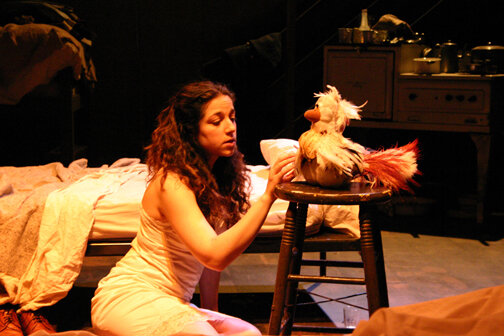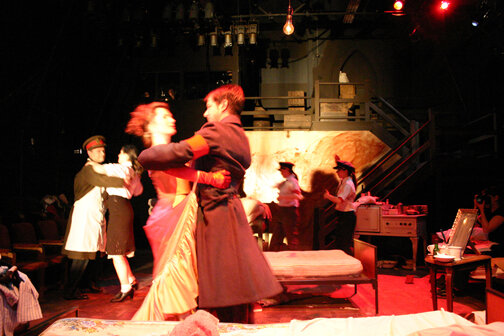MEIN KAMPF - A FARCE
by George Tabori
Directed by Birgit Schreyer Duarte
STUdio theatre, University of Toronto
March 30 - April 10, 2005
CAST
Shlomo Herzl Daniel Krolik Adolf Hitler Scott Moore Lobkowitz / Himmlisch Paul Babiak Gretchen Jordana Commisso Frau Death Susan Hamann Leather Freaks Michelle MacArthur, Laura Rocca, Lydia Wilkinson
CREATIVE TEAM
Set Claudia Kada Lighting Sharon E. Reid Costumes Aleksandra Podbereski Sound Design Natalie McCallum and Birgit Schreyer Schreyer Duarte Assistant Director and Dramaturg Natalie McCallum Research Dramaturg Eszter Jagica Stage Manager Caroline Young Assistant Stage Manager Gillian Levene Choreographer Emily Winerock Producer Graduate Centre for Study of Drama, Theatre and Performance at University of Toronto Poster Design Louis Schreyer Duarte Photography Aleksandra Podbereski
DIRECTOR’S NOTE
Darf man das? Is one allowed to do that?
“Tabori, as an emigrated Jew, is in this respect privileged”, and “One is allowed if one is called George Tabori, a theatre-man with a faultless biography, who masters like no one else the grotesque over-drawing as a theatrical device”. These are some of the answers critics have found to this question, one that time and again arises as the main reaction to Tabori’s bold and taboo-breaking plays.
Without having seen a production of it, most people initially react to this play’s content and especially its generic description, “a farce”, very strongly, ranging from fascination to disbelief to disgust. And often it is not quite clear what seems the most outrageous about Tabori’s Mein Kampf: the fact that a play can have the same title as Hitler’s infamous 1924 autobiography and political manifesto, or that we get to see a different and laughable Hitler character, unlike that of the stereotype most people are familiar with, or that the author dares to challenge us to laugh in the face of this most horrific historical context, our knowledge of which will undoubtedly inform our perception of the events on stage. Admittedly, this parody of Hitler’s person is not at all the first, nor even the most popular one: Chaplin and Brecht are, of course, among the most famous artists who rendered the monster ridiculous long before Tabori did. What makes Tabori’s version so subversive, however, is so I believe, its playful perversion of not ONLY the Hitler mythos, but also of the mythos of Jewish-ness, of Christian dogma, of canonical literature, and of history’s unquestioned authority; its transgression of the limits of genre (it was also labeled a farce en noir), and above all, its underlying message within Hitler’s and the Jew Shlomo’s relationship: that both can be seen as two sides of the same human being, that the play suggests a symbiosis that is unheard of and dangerous. With this “German fairy tale”, with this depiction of “two antipodes of the self” drawn to one another, Tabori allowed himself and the audience to experience the cathartic function of theatre: “It’s my Hitler. Hitler in me. It’s an exorcism, like everything else I write.”
On a more personal level, I was immediately drawn to the “theatricality” of this play, which in this case and for me means: its fabulous roles that consciously evoke and at the same time deconstruct certain stereotypes; its play with the audience’s knowledge and expectation, its challenge of our assumptions (through the sock in the coffee pot, the flirt with the allegorical figure of Death, the lesson in shoe shining, the discussion of Gretchen’s virginity, etc.); and its discourse on the power of humor, words, and role-playing. What is more truthful, the historical fact or the artful rendering, the poetic coping with the same dark chapter in history? What are we to believe? Could Hitler the artist really have prevented the crimes of Hitler the politician? Which role does love play in this configuration?
Tabori was not interested in purely historical accuracy in his dramas, and neither are we. If this show stimulates some spectators to rethink their own view of humankind, or of love, or of religion, or of humor, or of history for instance, then taboo-breaker Tabori should be content with this Canadian (almost) premiere of his most popular play. Birgit Schreyer Duarte
Initially Tabori hooks us, makes us care about this foursome, particularly the vulnerable pairing of Schlomo and Gretchen. Tabori is as hard on his audience’s sensibility as he is on the lovers, yet even this is an enormous over-simplification. Schreyer & Kada (director and designer) undermine the farcical, while the performances further confuse our generic sense.
I felt gloriously cleansed afterwards, as if I had dreamt a comedy, laughing in my sleep. While I don’t know what is funny in such a world as this one, or more exactly, what could be laughable about such a subject, I had not thought there would be so many places in such a play where I could laugh. I want to see it again, to explore my reactions, and also to once again sample the bravura performances.
Leslie Barcza
FULL REVIEW HERE:
http://www.drama.ca/drama/main_articles/index.cfm?fuseaction=first&Articles_ID=188














